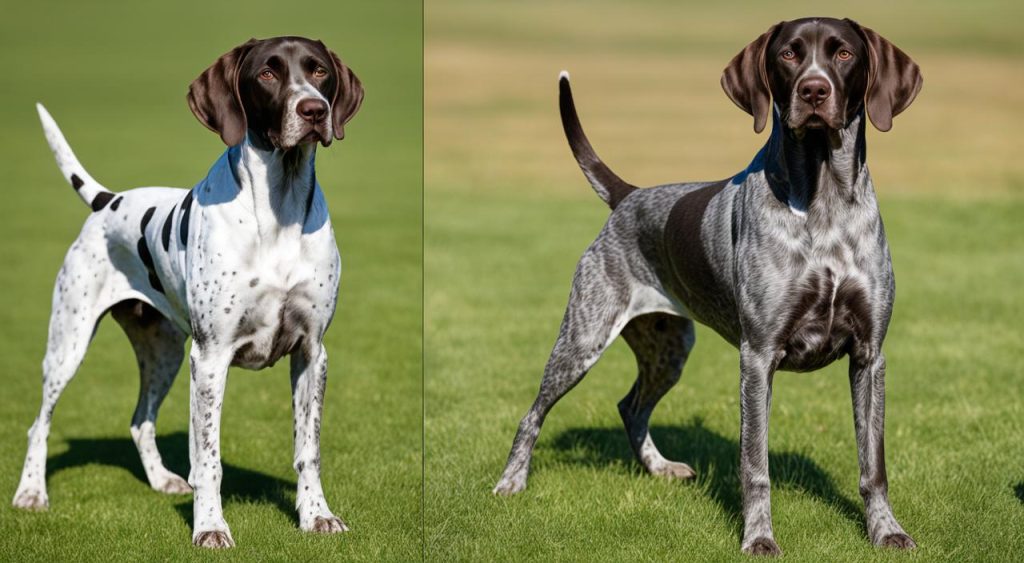German Shorthaired Pointers are known for their gentle and good-natured temperament, making them excellent companions for people and other animals. However, like any dog breed, they may display occasional aggressive behavior. Understanding the aggression levels and tendencies of German Shorthaired Pointers is crucial in providing appropriate care and training for these dogs.
Aggression in German Shorthaired Pointers can be triggered by various factors, including abuse, fear, incomplete socialization, possessiveness, maternal aggression, and frustration. It is important to differentiate between true aggression and perceived aggression. True aggression is characterized by signs such as a stiff body, growling, baring teeth, biting or snapping, and raised hackles. Perceived aggression, on the other hand, may manifest as play biting, play growling, and low levels of resource guarding.
To effectively treat aggression in German Shorthaired Pointers, it is essential to identify the triggers or causes behind their aggressive behavior. Consulting a dog behaviorist can be beneficial in uncovering the underlying reasons for aggression and addressing them through positive reinforcement and behavior modification techniques. It is important to avoid using force or punishment as it can exacerbate the aggression and damage the bond between you and your dog.
German Shorthaired Pointers should not be labeled as inherently aggressive dogs. With proper training, socialization, and environmental stability, they can exhibit their true nature as loyal, loving, and gentle companions. Establishing an early and consistent obedience training routine and exposing them to various people, pets, and situations from a young age aids in their development into well-adjusted and confident dogs. It is crucial to provide responsible ownership and understand the unique traits and needs of German Shorthaired Pointers to effectively manage and control any potential aggression.
Key Takeaways:
- German Shorthaired Pointers are generally gentle and good-natured, but may display occasional aggression.
- Aggression can be triggered by factors such as abuse, fear, incomplete socialization, possessiveness, maternal aggression, and frustration.
- Understanding the difference between true aggression and perceived aggression is important for effective management.
- Treating aggression in German Shorthaired Pointers requires identifying the underlying causes and seeking professional help.
- Proper training, socialization, and environmental stability are crucial in shaping their behavior and preventing aggression.
How to Treat GSP Aggression
To effectively manage aggression in German Shorthaired Pointers, it’s crucial to identify the triggers or causes behind their aggressive behavior. These triggers can vary from simple stimuli like encountering another dog or a stranger to more complex factors such as certain colors or specific experiences during their puppyhood.
Consulting a professional dog behaviorist can prove immensely beneficial in uncovering and addressing the underlying causes of aggression in German Shorthaired Pointers. They possess the expertise to analyze your dog’s behavior and provide tailored recommendations for effective treatment.
Additionally, it is advisable to schedule a thorough vet checkup to rule out any potential underlying medical conditions that may be contributing to the aggression. Identifying and addressing these medical issues can significantly help in reducing aggressive tendencies.
“Seeking professional help and guidance is crucial when dealing with aggression in German Shorthaired Pointers.”
It is vital to approach the training and treatment process with patience and a commitment to positive reinforcement techniques. Using force or punishment can exacerbate aggression and harm the bond between you and your dog. Utilizing proven methods of behavior modification that focus on rewarding desirable behaviors and redirecting or managing aggressive reactions is highly recommended.
In cases of severe aggression, it’s important not to attempt to treat the issue without the guidance of a professional. Severe aggression problems can be dangerous, and they may require additional interventions such as medication. Following the behaviorist’s advice and being consistent in the behavior modification process are essential in successfully managing aggression in German Shorthaired Pointers.
The True Nature of German Shorthaired Pointers
German Shorthaired Pointers have often been misunderstood due to their hunting background and high prey drive. However, it is important to recognize that this does not automatically make them aggressive towards humans or other pets. In truth, German Shorthaired Pointers are known for their loyalty, affection, and gentle nature when provided with the right training, socialization, and stable environment.
Early and consistent obedience training plays a significant role in shaping the behavior of German Shorthaired Pointers and preventing any misconstrued aggression. By implementing proper training techniques, you can guide your German Shorthaired Pointer to develop into a well-behaved companion.
Additionally, socialization is key to ensuring a pleasant temperament. Exposing your German Shorthaired Pointer to various people, pets, and situations from a young age helps them become well-adjusted and confident dogs. While it is true that they may have a strong prey drive, with proper introductions and training, they can peacefully coexist with other pets in your household.
Understanding the true nature of German Shorthaired Pointers not only dispels false assumptions but also empowers responsible ownership. By implementing appropriate training, socialization, and recognizing their unique traits and needs, you can effectively manage and control any potential aggression in German Shorthaired Pointers. Remember, these dogs are loyal, loving, and make wonderful companions when given the care and attention they deserve.





